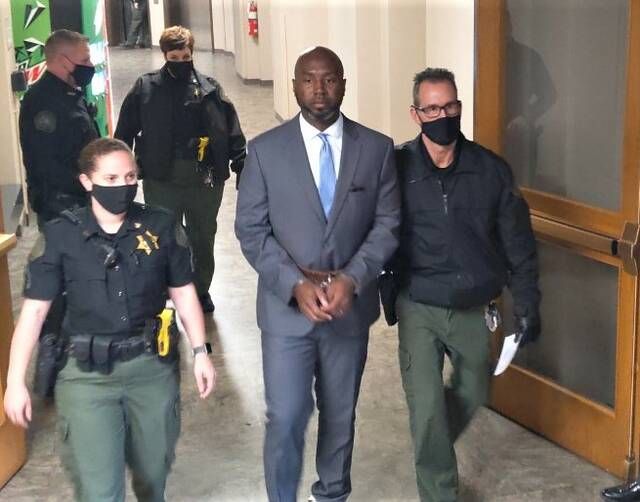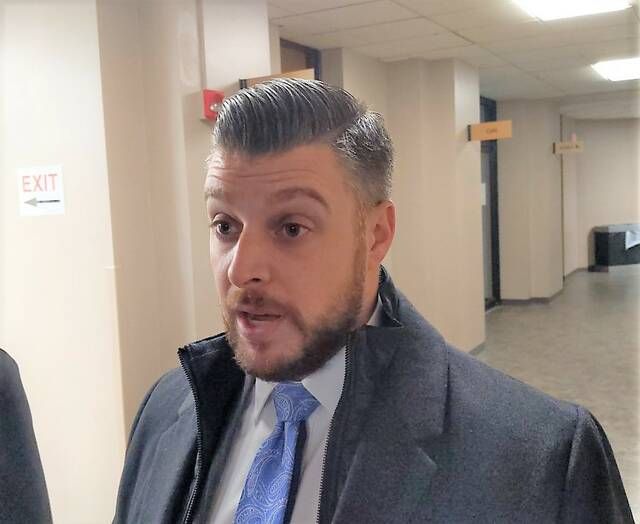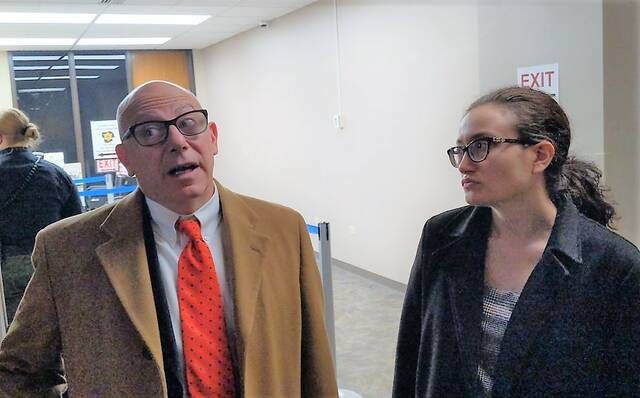Click here to subscribe today or Login.
WILKES-BARRE — A Luzerne County jury Thursday found Kyon McDonald guilty of voluntary manslaughter in the shooting death of Tierese Owens outside a Plymouth bar in 2018.
Prosecutors and McDonald’s defense lawyers expressed mixed feelings after the jury announced their verdict following deliberations lasting nearly 10 hours over two days.
McDonald, 37, showed no emotion as the jury foreman announced “not guilty” on charges of first-degree and third-degree murder, but slightly rolled his head back when he was found guilty on the lesser offense. His wife, Kimberly McDonald, clutched a Bible and quietly sobbed.
“We’re upset, I think this was self-defense, that was our argument from day one, that was his argument from day one and that’s what he told state police the day he was arrested. I believe the jury found it was an imperfect self defense, that’s why it was voluntary,” defense attorney Theron Solomon said. “When the (prosecutors) shoot for life in prison and you get voluntary … you have to look at this as a win but I know Mr. McDonald is very upset. He believed he was justified, so do we. I think the jury being out as long as they did and coming back with manslaughter, I think they spent about 12 hours discussing if he was justified or not and I believe he was.”
McDonald will likely receive credit for 37 months time already served since his arrest by state police at Wilkes-Barre on Sept. 29, 2018, two days after the shooting.
Solomon said sentencing guidelines for voluntary manslaughter call for a prison term of 42 months to 10 years. A conviction of first-degree homicide calls for a sentence of life in prison while a third-degree murder conviction results in 20 to 40 years.
Judge David W. Lupas, who presided over the trial, will sentence McDonald on Jan. 4.
“These are always difficult cases, you can tell there are emotions on both sides,” McLaughlin said. “Whenever you deal with a case of self defense, we not only have to prove the criminal homicide elements but also have to disprove self defense. It’s a high burden for the commonwealth. We respect the jury’s verdict
“Obviously, we feel the facts and evidence and the law supported a conviction on a higher count. At the end of the day, what is clear, the jury did not exonerate the defendant. They did not excuse his conduct, they did not find he acted justifiably,” McLaughlin said.
Throughout the six day trial, prosecutors and McDonald’s attorneys relied heavily on surveillance videos inside and outside Robbie Nick’s Sports Bar at East Main Street and Washington Avenue.
Both sides gave the jury their interpretations of what occurred inside the bar with footage showing Owens, 33, entering and greeting McDonald with a high five and a hug.
Outside, cameras recorded McDonald, armed with a Taurus 9mm handgun, involved in a dispute and Owens coming face-to-face with him.
Witnesses, including McDonald’s wife and the bar’s owner, Robert Nicoletti, testified Owens repeatedly yelled threats to McDonald saying he was a member of the Crips street gang and was going to kill McDonald.
Nicoletti pushed and shoved Owens away from McDonald.
McDonald testified in his own defense telling jurors he believed Owens left the area.
Owens broke free from Nicoletti and ran toward McDonald yelling he was going to kill him, his family and children.
As Owens got within several feet, McDonald raised his arm and fired a shot striking Owens before firing six more rounds into him.
State police Cpt. Kevin Selverian, a specialist in the use of force, testified the time between the first and second shot was 2.86 seconds.
McLaughlin and co-prosecutor Susan Luckenbill argued McDonald formed intent to kill during that time lapse when he fired the additional six shots.
Jurors began deliberating at about 3:30 p.m. Wednesday until they were released upon their request by Lupas at 11 p.m.
Deliberations resumed just before 10 a.m. Thursday.
Around noon, jurors sent three questions seeking to review footage of the shooting and to review the Duty to Retreat doctrine of the self defense claim. Solomon and co-defense attorneys Barry H. Dyller and Tara G. Giarratano, played a fourth video for the jury showing Owens with his hands to his waistband while face-to-face with McDonald.
Solomon argued throughout the trial that McDonald feared for his life believing Owens was armed with a weapon that night.
No weapon was found on Owens’ body.
To counter the self defense argument, McLaughlin and Luckenbill showed footage of the shooting that illustrated McDonald did not step back or turn and run away as Owens charged at him.
“When you have an individual who takes it upon himself to arm himself and inject a deadly weapon into a volatile situation who was relatively safe inside a bar and walks up to a confrontation, draws a gun, I don’t think that is an act of deterrence, I think that is an act of escalation and you invite the very same thing we saw happened,” McLaughlin said.
McDonald’s attorneys are expected to file an appeal claiming the trial should have never taken place citing Rule 600, known as the speedy trial rule.
During pre-trial hearings, Dyller requested the case be dismissed and again at the start of trial arguing prosecutors were “not trial ready,” and it was more than three years since McDonald’s arrest. Dyller further argued during the trial prosecutors failed to disclose certain evidence in a timely manner, and investigators failed to review video recordings of John Sims kneeling over Owens’ body and running to a dumpster behind the bar prior to Plymouth police arriving at the scene.
Solomon suggested many times during the trial Sims, a witness to the shooting who testified, removed a weapon from Owens’ body. Sims denied he took a weapon from Owens.
“We do have a great appeal,” Solomon said. “The trial should never have happened because of the rule 600 issues. We have to realized we went up against as high as it gets and it’s a great result but still in our minds the wrong one because it should have been a not guilty all the way around.”
Lupas denied a request by Solomon to set bail, resulting in McDonald remanded to the county correctional facility.







